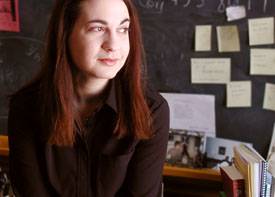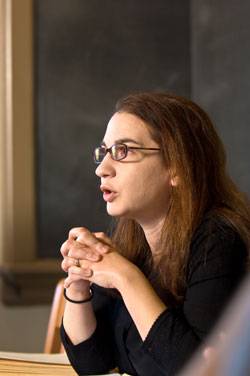Stories & Beer | Saturday March 2nd | 5:30ish p.m. | Mike & Molly’s | FREE
 It probably doesn’t seem like it, but Stories & Beer has been around for three years this March. So in order to celebrate, we decided to have a bunch of badass authors read some stories/poems while we sit around and drink beers. One of those badass authors hails from Galesburg, Illinois, where she teaches Creative Writing at Knox College. If you don’t know Monica’s work, well, you probably haven’t been reading very many rad literary magazines lately (she’s EVERYWHERE!). But don’t sweat it. Monica was kind enough to answer a few of Laura Adamczyk‘s questions.
It probably doesn’t seem like it, but Stories & Beer has been around for three years this March. So in order to celebrate, we decided to have a bunch of badass authors read some stories/poems while we sit around and drink beers. One of those badass authors hails from Galesburg, Illinois, where she teaches Creative Writing at Knox College. If you don’t know Monica’s work, well, you probably haven’t been reading very many rad literary magazines lately (she’s EVERYWHERE!). But don’t sweat it. Monica was kind enough to answer a few of Laura Adamczyk‘s questions.
Smile Politely: I understand you’ve been collaborating with fellow poet and Knox College alumna Beth Marzoni on some poetry and prose. What has this collaboration done for your writing? Because you seem to address some of the poems to her, I wonder what she represents as an ear for you. Is she the ideal reader of these poems?
Monica Berlin: Making poems with Beth probably saved my life at a time when it most needed saving. I mean that as dramatically as it sounds, and as sincerely. I’m not someone inclined toward modesty when it comes to how important other people are to me, and about Beth Marzoni and her work, her careful ear, her companionship on the page, well, I’d put up a billboard and call in a skywriter.
All that said, the making itself is really private for us, and it’s something we’ll likely both struggle to talk about with others. There are the poems, and we send them out into the world for others to read and consider, but the making — that’s ours.
About audience: Is Beth my dear reader? Hm. Hard to say. She is the ideal co-author of these poems. Of that I’m certain.
Smile Politely: You write both prose and poetry. Do you begin writing knowing that a piece will be an essay? A poem? Or do you decide that during the process? Does one form let you do things that the other, perhaps, cannot? Is this question even relevant in your process?
Berlin: I do write both, yes, and only sometimes do I know what I’m doing when I’m doing it, or beforehand. Sometimes it’s clear within a few lines or sentences, stanzas, or paragraphs. Sometimes I reach the end of the piece, and start to work on revision by reading aloud, which is one of the things I do, and I’ll hear it pretty quickly — that it isn’t a poem at all or that it is absolutely a poem. Sometimes I write the same piece in prose and in a poem, by which I mean, I’m working with an image or idea or a subject, and I write two distinct pieces in each genre, because I’m trying to figure something out and can’t do it through one genre or the other. Hard to say how intentional any of this is.
How aware I am of what I’m doing when I’m doing it is another matter entirely. Somedays I privilege one genre over the other, but that usually has more to do with what I’m reading and teaching than with what I’m writing. Mostly, I try not to crowd the writing itself with these kinds of questions. Is this a poem? Does this want to be an essay? Line or sentence? Paragraph or room? Etc. I’ve got to get it down first, you know? Whatever it becomes it becomes. I don’t mean to sound flippant. About writing, I hope I’m never flippant, but I also don’t want to be so rigid in my thinking about genre that I forget to leave space for discovery and wonder, for curiosity and mistake turned other than. Sure, there are times making a poem lets me do things an essay can’t, and vice versa, but both genres afford a kind of expanse and a kind of precision. Both allow for simultaneity and wandering. Both let me get lost and eventually both let me find my way out.
Smile Politely: What are you reading these days? What writers do you find yourself going back to?
Berlin: My go-to pile these days includes three different books by James Agee, Victoria Redel’s new book of poems, Woman without Umbrella, Carole Maso’s newest, Mother and Child, Dean Young’s Bender, and also 7 Poets, 4 Days, 1 Book, in which Young is one of those seven poets, Lia Purpura’s Rough Likeness, again, Trespasses by Lacy Johnson, several books and articles on rivers, and the always prompt New Yorker. (One of my New Year’s resolutions was to not let it stack up, and so far, I’ve stayed on course — though as I type this, the mailman is heading up my stairs, likely with the new issue.)
The list of writers I come back to will seem like a wild and eclectic catalogue or a shopping list, but that we can’t help what we like and what we need, I am unapologetic. In fiction, Virginia Woolf, William Faulkner, Peter Orner, Carole Maso, Marilynne Robinson, Don DeLillo; in poetry and nonfiction I come back again and again to Ralph Angel, Nancy Eimers, Marianne Boruch, Eula Biss, Susan Neville, Purpura again, Rick Jackson, and Keith Ratzlaff. I keep a little book by Paul Klee near, and one with interviews of Frank Gehry. Buster Keaton’s autobiography is on my desk, always staring at me, always reminding me what I need to do.
Smile Politely: What can we expect from you at Stories & Beer next Saturday?
Berlin: Hard to say, really. Likely, I’ll read without going over the time limit, my voice will shake a little and my hands will shake a lot, and I’ll probably be wearing fantastic shoes. You can be sure I won’t juggle or eat fire, but beyond that, well, let’s leave room for some spontaneity and whimsy, hm.








